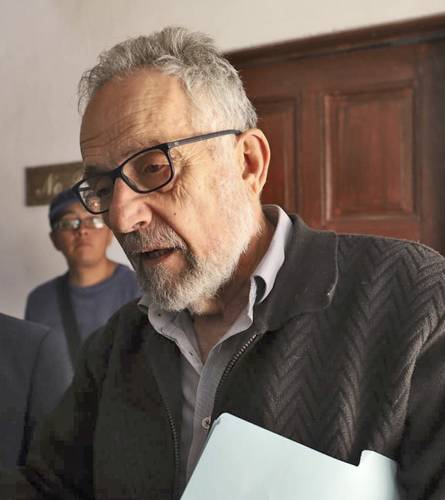Guadalupe de la Luz
The privatization of water “is an absolute perversion in the name of efficiency. A lie! It is in the name of business,” said Pedro Arrojo Agudo, special rapporteur to the United Nations (UN) on human rights to drinking water and sanitation. He warned about the risks of the commodification and financialization of water in Mexico and pointed out that there are two major challenges to have access to it: the recovery of natural engineering and a democratic governance of the liquid.
He warned about the risks of the commodification and financialization of water in Mexico and pointed out that there are two major challenges to have access to it: the recovery of natural engineering and a democratic governance of the liquid.

Photo: Alejandro Ancona
Arrojo Agudo participated in the forum “Challenges to guaranteeing the human right to water and sanitation in Tlaxcala”, convened by the civil organization Centro Fray Julián Garcés, Human Rights and Local Development, which was attended by community representatives.
The diplomat explained that close to 2 billion “terribly impoverished people, who live next to a polluted by toxins river or aquifer, do not have guaranteed access to drinking water, and 4 billion do not have access to basic sanitation. What a shame!”.
He stressed that there are two great challenges: “First, make peace with our rivers, with the nature that surrounds us, learn the message of the indigenous peoples, of the peasant communities.” Otherwise, he warned, it will be impossible to move forward as humanity. It is necessary to “recover natural engineering that works well with solar energy.”
He emphasized that having a healthy river at the doorstep “cannot be a luxury for the rich, it is a vital need for the most impoverished people in a situation of greatest vulnerability; it is a democratic and human right.”
He indicated that the second challenge is to promote a democratic governance of the resource, “understood as a common good accessible to all, and not appropriated by anyone or as privatized merchandise.”
Pedro Arrojo stressed that water must be managed with responsibility and an effort, “and not through a market logic, it must be done from a collective and community, leaving no one behind.”
He stated that the drinking water service “cannot be cut off”, this is why he proposed creating adequate legal measures to prohibit such action against a family in a situation of poverty or vulnerability, “because it violates the human rights.”
He declared that the water supply is an obligation that all States have signed; “It is not a generous option for politicians or authorities, but it is the right of the population to demand it.” Water, he stressed, is a necessity for a dignified life, “not a luxury or a whim” and must be taken care of by everyone.
He articulated that the commodification and financialization of water, which is a public good, “is not yet so much a problem here (in Mexico), but it will become one.” He cited that in some European countries “only those who can pay more, end up having it”, which is unfair “and violates human rights”.
He warned that financialization “is the greatest of follies”, because it is speculating with the lives of people in the financial markets.
In the forum, specialists and Tlaxcalan communities exposed the serious contamination problem of the Alto Atoyac basin and its effects on human health.
In addition, the initiative presented in the local Congress on the Law for the Provision of Drinking Water and Sanitation Services of the state of Tlaxcala, which tends to privatization, criminalization and does not guarantee the human right to vital liquid, was analyzed. Next Wednesday will be World Water Day
Original Article: https://www.jornada.com.mx/2023/03/20/estados/029n1est
English translation by Schools for Chiapas.
